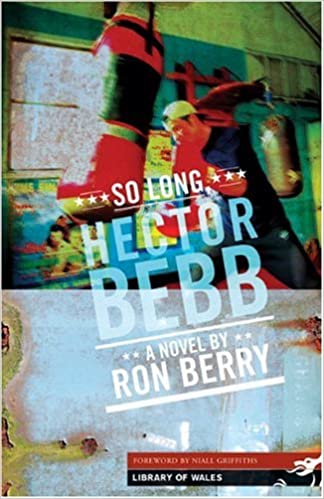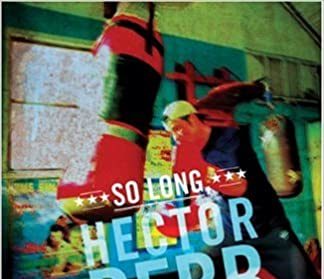In a new series for Wales Arts Review, we present a series of introductory essays to some of the greatest works in Welsh literature. The Library of Wales is a classics series celebrating the literary culture of Wales in the English Language primarily in the 20th century. It was launched in 2006 with five titles, So Long, Hector Bebb, Border Country, Country Dance, The Dark Philosophers & Cwmardy. It has now fifty titles in the series with close to 100,000 books sold and can claim to have changed the perception of Welsh writing in English, reinvigorating the interest in classics such as WH Davies’s Autobiography of a Super Tramp and Dorothy Edwards’s Rhapsody, while bringing new light to titles that fallen from view such as Frank Richards’ memoir of army life in Old Soldiers Never Die and Leonora Brito’s Dat’s Love and other stories. Many of the titles are now being taught at university level while Poetry 1900 to 2000, an anthology edited by Meic Stephens has been added to the GCSE syllabus in Wales. The series has also inspired radio dramas, stage plays, art exhibitions and much political and cultural commentary. The Library of Wales 1 to 50 series was edited by Professor Dai Smith and published by Parthian.
Each book includes an introduction giving us an opportunity to reconsider the series through an enthusiast’s eyes.
The first title in the series was So Long, Hector Bebb by Ron Berry. It is a multi-voiced narrative of a boxer going on the run after committing a crime. The cover of the book is a picture of Joe Calzaghe training. It is introduced by the writer Niall Griffiths whose own latest book is Broken Ghost, has just won the 2020 Wales Book of the Year Award..
*
 Almost three decades on, I can still remember the thrill of discovering So Long, Hector Bebb. Five pence it cost, or something like that, from a church hall jumble sale somewhere in Liverpool. What drew me to it I don’t know – the Americanism in the title? The author’s prettyname? Simpler to state that there were forces at work. The mysteries of my eight year old mind forever forgotten long since, Iremember taking it home and up to my bedroom and I remember sitting on my bed beneath the football posters and I rememberopening it and I remember reading this:
Almost three decades on, I can still remember the thrill of discovering So Long, Hector Bebb. Five pence it cost, or something like that, from a church hall jumble sale somewhere in Liverpool. What drew me to it I don’t know – the Americanism in the title? The author’s prettyname? Simpler to state that there were forces at work. The mysteries of my eight year old mind forever forgotten long since, Iremember taking it home and up to my bedroom and I remember sitting on my bed beneath the football posters and I rememberopening it and I remember reading this:
We’re each and every one of us shaped for muck and glory, thank the Jesus Christ All-bloody-mighty for it and all.
And I remember reading this, too:
Hect just vanisht. Not so much as ‘So long then Lennie, see you in the mornin’. All cause Milly flasht her old twat inna TransportCaff. Milly and her big greesy minj.
And I remember thinking something like: My God, the grown-up people around me and the ways they talk, the words they use so unlike anything in a set-text syllabus… they can be Literature.
Actually, I thought nothing of the sort – I was eight, nine years old, for God’s sake. My reaction to Hector Bebb then was much as it is now, which is to say of an emotional nature, reactive in a glandular sense, the words making me feel immediately excited and alive, quick on this puzzling planet. True, discovering Berry’s work at such a young and impressionable age undoubtedly influenced the development of my then nascent obsessions, but it was his language, before all else, that set the heart to beating, that made the palms sweat. Look at this, from Bebb’s opening pages:
They worked Bump in one of those ten by ten rings. Tiddley-wink pitch. After the 1st round Abe is advising this wonder-boy howto catch me with his heavy right hand. Bump’s dinger, his one and only, the stupid chucker.
I mean, what’s that? It’s not really English, of any recognisable sort (and, of course, thank God for that). But see the fun the language has, when twisted into such shapes? See how it loves to be mauled in a miner’s hands, a boxer’s hands, how it loves to be allowed to run riot? Here we have the English language pushed, pummelled, roughly played with, made utterly unfamiliar. Made attractive again, even. To an eight year old, taught that books were really for other people, people not like him, and who was, in the absence of anything else, devouring match programmes and I Spy books, all of this came like a hurricane. That words could be made to do such things. That the accents heard every day and everywhere could appear convincingly on a page, in a book. That the way he and his peers spoke could be in some way important…
And then, like Hector, Ron Berry ‘vanisht’ too – a great and disastrous retreat from the public consciousness. I lost my copy of Hector Bebb somewhere a long time ago, but the story stayed with me, always, until it reappeared in a concrete form only a few years since (thanks to the internet, and a particularly kind fan), shortly after my first novel was published. Rereading it, I was astonished and delighted to see that it had gained power throughout its dormant years. Over the decades it had obviously mutated into a kind of chronicle of and elegy for a specific time and place, but the voice within it (fourteen voices, actually), the confidence of its telling, and the informing compassion throughout had not diminished in any way, and only a writer working from within his own culture with a determination that, in a marginalised psyche, amounts to a kind of defiance, can achieve such a feat.
Berry not only displays a profound knowledge of and familiarity with his subjects, the places and people, but he declares an unjudgemental love, too. His work is of enduring sociological interest, yes, but this way of approaching it stands revealed as the pale and bloodless academic hobby it is when set alongside the depiction of the marrow-deep emotional scarring of his cast of characters. Physical scarring, too: in Berry’s world, people seldom reach middle-age whole – they fall off scaffolding and are crippled for life, their legs are mangled in scraper-chains, they are crushed in rock-falls, they drown in liquid slag. The Aberfan carnage shadows all of Berry’s work after 1966, of course – how could it not? So, as well as a portrayal of early post-war Valleys life, in which a culture was being caused to crumble (Berry is honest – no pre-Thatcher Eden here), we also get an exegesis of the beast in man, an alarmed pointer to the very thin ice on which we walk. See Hector gone feral, living in the hills amongst the rusted hulks and ruins of a wrecked industry, beard to his belt-buckle, hair to his haunch. See him kill and eat the sheep and dogs. It’s not only Heart of Darkness, it’s The Golden Bough, too: the consequences of Hector’s innate aggression send him wild, but so does his unconscious rejection of the ways in which society forces us to warp our true nature. We are torn by the discrepancy between what we really think and feel and what we are conditioned, as social creatures, to say; broken in the breach caused by convention and compelled accommodation, as encapsulated in the chapters written from the point of view of the character Sue, which are masterpieces of convincing narrative and thematic compression. Abe Pearson knows this:
If it’s in the blood is what I say. Whatever’s circling in the blood, let it come out. Stand back and watch. Block human nature andyou’ll get more red than black on the audit.
It’s terrifying, this novel. Don’t go to it for an easy read, but do go to it for an utterly unique, vital one. It’s a trail-blazer, a ground- breaker; those of us who feel driven to explore structure and voice, to barge at the boundaries of the novel form, we are all Ron’s progeny. He started it, and what a poorer place the world would be without him.
Widespread recognition eluded Ron in his lifetime. This is a shame, of course, but the sadness of it is lessened somewhat when it happens to one who understood, so deeply and completely, the fragile and temporary flickering of all human endeavour. This, I think, is Ron, speaking through his character Gwen Wills:
We’re all of us human beings. High and low we come from the same place, we survive somehow and then we fade away.
To ‘survive somehow’… it’s no exaggeration to assert that this novel will help you to do that. In the grandness of its themes, in the sympathy of its characterisation, in the gleeful exuberance of its wordplay, So Long, Hector Bebb is an ultimately affirmative work of art. I believe it is one of the greatest novels to come out of the twentieth century. I had to wait nearly thirty years before I could experience it as an adult – you don’t. Here it is, now. Read on.
You might also like…
In this first of a new set of articles, Wales Arts Review publishes introductory essays on the titles in the Library of Wales series of books, beginning at the beginning, with the first to be published, Raymond Williams’ Border Country.
Ron Berry was born in 1920 in Blaen-cwm in the Rhondda Valley, and worked as a miner from the age of fourteen. Although he served in both the Army and the Merchant Navy in the Second World War, his consistent attitude to all authority was to absent himself from it. He was a gifted sportsman who had played for Swansea Town, and was an occasional boxer, but it was a year in adult education at Coleg Harlech in the early 1950s that released him from sporadic casual work to concentrate on writing. Against all odds he never flagged in this determined pursuit.
His first published novel, Hunter and Hunted, appeared in 1960 and was followed by Travelling Loaded (1963), The Full-Time Amateur (1966), Flame and Slag (1968) and So Long, Hector Bebb (1970). He also wrote shorter fiction for television and radio. His last novel, This Bygone, was published in 1996. He died in 1997 and his Collected Stories and autobiography, History is What You Live, appeared posthumously in 1998.












